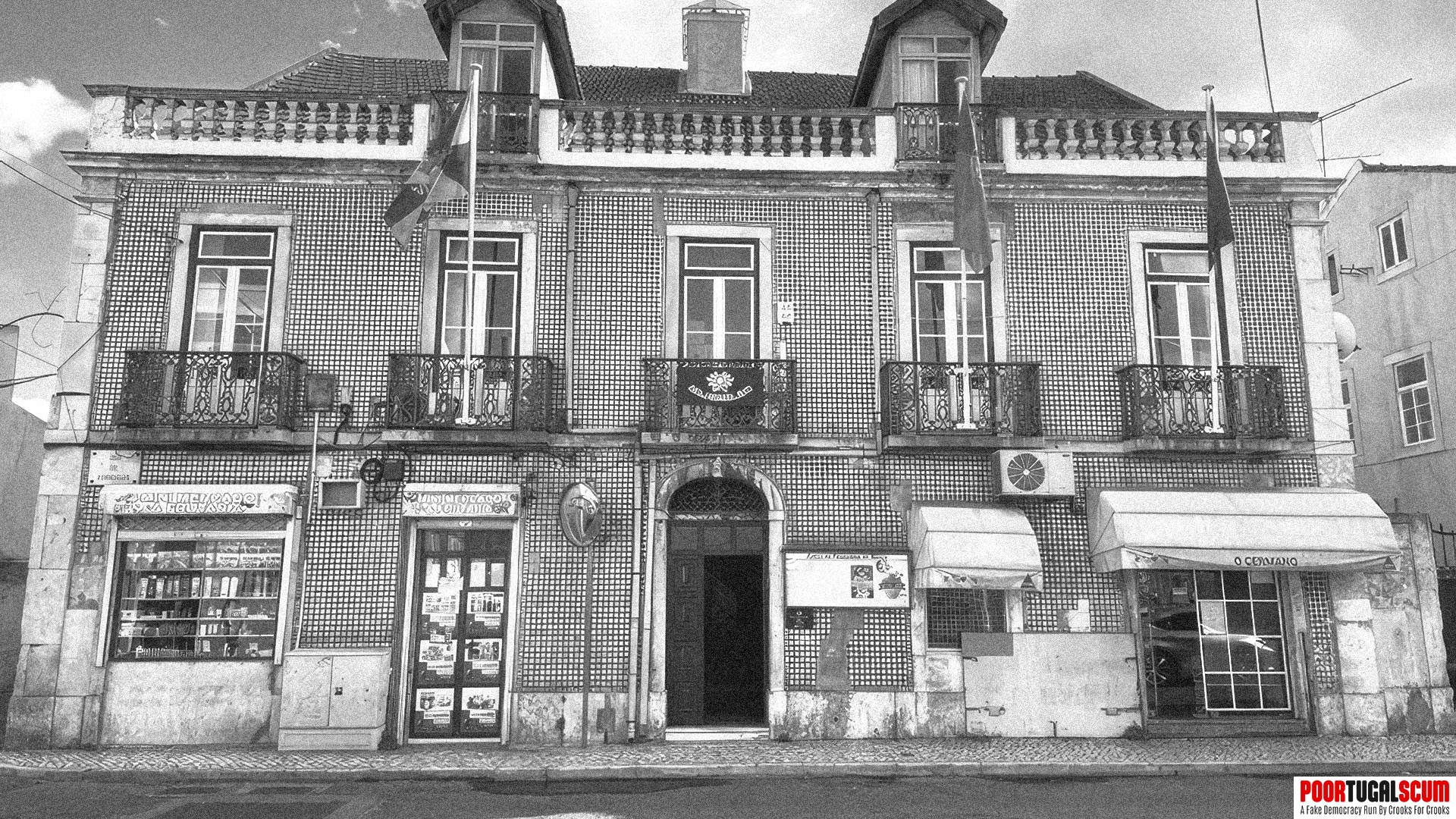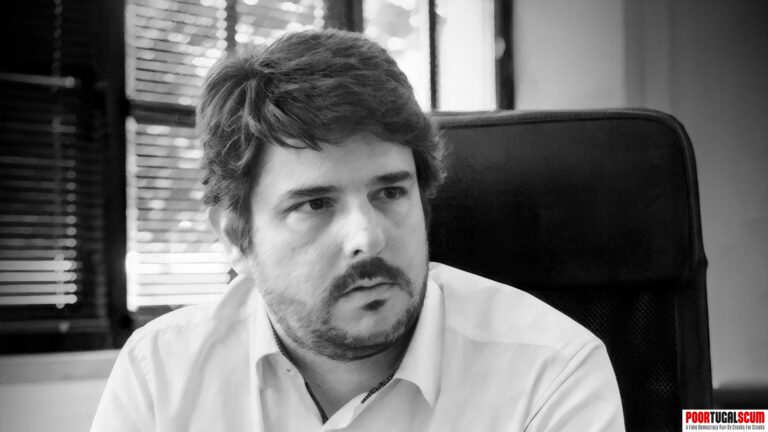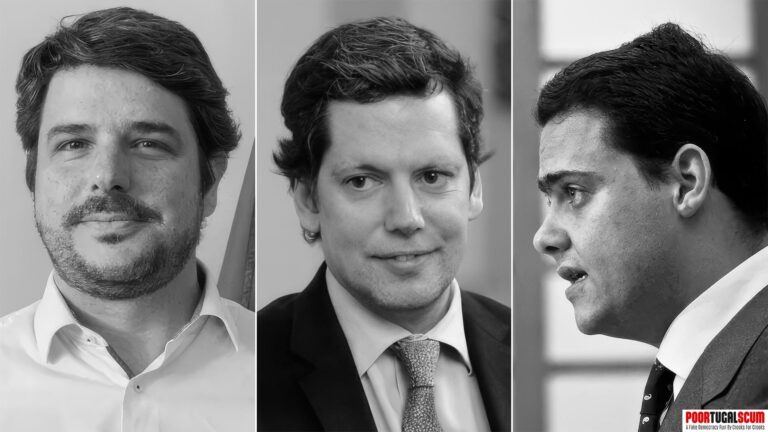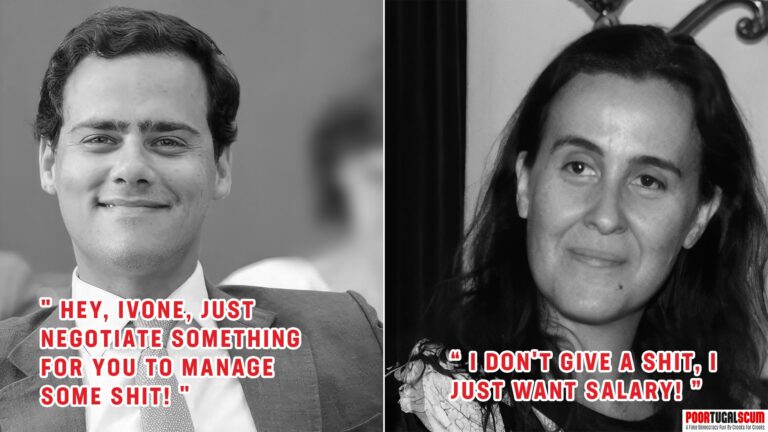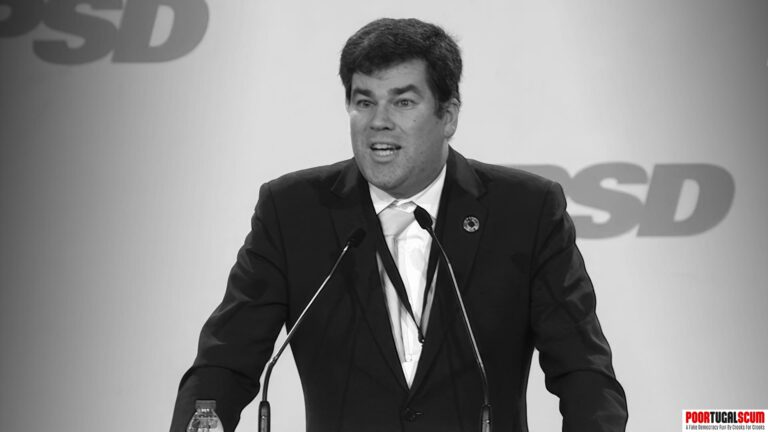Forgive my expression, but this already seems like an orgy of corrupt.
The shamelessness, the lack of scruples, the normality is absolutely abysmal in Portugal. Contracts worth more than 70 thousand euros are awarded directly to one-person companies that have been set up in a hurry, a month ago or very recently, and therefore have no history or even clients.
Corruption in Portugal is “legal” because the laws are made by the same corrupt politicians.
It’s funny that in Portugal there is definitely a great difficulty in calling things by their true names. Everything the participants say in this report is very true, but please, man up and do not replace corrupt and corruption with the term “lack of ethics”. As long as this fear of confronting these criminals continues, the Portuguese will only be robbed more and more and become poorer and poorer.
In this interview, one of the participants also says, “with a faint innocence”, that if the Portuguese were asked, “the citizens would consider this reality reprehensible”, please, do you really believe that?! Portugal is the way it is because the vast majority of Portuguese are exactly the same as those who steal from them, they have exactly the same lack of character, they are also very stupid, so they don’t even care about being robbed.
Most Portuguese even have a wonderful slogan for this phenomenon “steal but do it” WTF! Portuguese mental retardation at its best!
We are talking about a country where the average monthly pension is 490.65 euros, but many people receive a change of 231.88 euros!
The following article is a translation (mostly MT). You can find the link to the original website at the end of it.
In almost all parishes in Lisbon there are contracts signed with members of the elected party or close to it. Analysis by CNN Portugal found at least 60 in these conditions in the last two years. Much of it is consultancy and advisory services. Political scientists and corruption experts guarantee that this trend reveals “the lack of ethics in the sector”
The “phenomenon is recurrent”, “it may be even bigger than what one might think”
and “reveals the lack of ethics that exists in the sector”. This is how Luís de Sousa, political scientist and expert on corruption, classifies the scenario of public contracting in the Parish Councils of Lisbon: local candidates with direct contracts, several thousand euros paid to companies owned by former deputies in the Assembly of the Republic and members of municipal assemblies who are, at the same time, advisors in parishes of the same political color.
These situations, visible through the Government’s platform for public contracting, exist in almost all parishes in the capital and thus reveal that it is often those who have connections to parties who end up being hired by direct agreement or by invitation to provide services. various services, especially in the areas of advisory and consultancy.
This practice, argues Luís de Sousa, “distorts free competition and, in addition to financial damage, can generate reputational damage”. According to this researcher, who has conducted inquiries into deontologically reprehensible behavior by politicians, there is no doubt: “If the Portuguese were asked whether it is correct for a member of a municipal assembly to have a contract by direct agreement with a Parish Council, the citizens would consider this reality reprehensible.”
However, this is what is happening in several parishes in Lisbon, according to an analysis carried out by CNN Portugal, something that translates into a “brutal ethical conflict”, highlights André Corrêa d’Almeida, president of the All4Integrity association and associate professor at the University of Columbia, New York, highlighting that there is a risk that these people
“may influence the outcome of the mechanisms for which they were elected – and there is no legislation or tools to counter this”.
The leaders of the Parish Councils, for their part, claim that there is no incompatibility at stake and state that the choice of people based on political proximity is due to the convergence of thought and the lack of their own resources. However, corruption experts have another understanding: Luís de Sousa considers that this practice “does not safeguard the public interest” and states that “favoring people close to the party distorts the market and prevents a fair allocation of resources”. André Corrêa d’Almeida also highlights that in this type of contracts “if there are no public tenders, there is no guarantee that the Parish Council is paying the best price for the best service”.
Analysis of public contracts signed by the capital’s 24 parishes in the last two years shows that at least 60 contracts were agreed with people linked to political parties – including activists, former council presidents, members of parish assemblies, local candidates, deputies municipalities and former deputies in the Assembly of the Republic.
Public contracting in the Parish Councils of Lisbon has, in fact, been the subject of investigation for around six years as part of the Tutti Frutti case, an investigation revealed by CNN/TVI
that reveals an alleged conspiracy between leaders of the PS and PSD to negotiate political places also at the level of parishes and municipalities.
One of the key pieces of this process are the agreements given by Sérgio Azevedo, former PSD deputy, to social democratic activists to provide technical support services to the PSD group in the Lisbon Municipal Assembly. The Public Ministry understands that three activists, Patrícia Leitão, Filipa Lages and Nuno Vitoriano
received between 1,500 and 1,900 euros per month, in 2013, without doing any work.
This network of influence of the party in local power, particularly in parish councils, is still visible today: at least one of those activists, in this case
Patrícia Leitão, signed a contract this year by direct agreement to provide technical advisory services to the president from the Lumiar parish council, Ricardo Mexia, for 24 thousand euros.
Ricardo Mexia justifies this contracting by the need to acquire essential services that the Board did not have, adding that “the issue of possible incompatibility does not seem to exist”. “Neither the criterion of party affiliation is relevant. Neither positively nor negatively. We have people there who are members of other parties and others who are not members of any (which are the majority).”
Among the various Parish Councils that were investigated in the Tutti Frutti operation, Estrela is one of those that appears most frequently cited in the process and its president, the social democrat Luís Newton, arrived, in May of this year, asking to be defendant in this case. In the last two years, according to CNN Portugal from the State’s public contracting platform, the Parish governed through the PSD/CDS coalition, handed out contracts to former candidates, political coordinators and previous advisors to government officials from the same parties.
Raquel Abecasis, the previous independent candidate for the CDS for the Parish Council of Avenidas Novas and the legislature, founded the single-person company ‘100X+ CONSULTORES’ in December 2020. One month after the creation of the company, the Parish Council of Estrela signed with the Abecesis company a contract worth 18 thousand euros for the provision of communication consultancy services and, in March 2022, signed another identical one for 15 thousand euros.
At the same time, in January 2021, the same Board signed with consultant João Maria Jonet, who worked on the International Relations Commission of the Social Democratic Party and later on Jorge Moreira da Silva’s campaign against Montenegro, a contract for “consultancy within the scope of of the Innovation and Strategic Planning Office”. The contract, by direct agreement, would have a total value of 16,200 euros, but was revoked after 53 days, with only 3,321 euros being paid to Jonet.
To CNN Portugal, a source from this Parish Council details that its executive “does not adopt the candidate’s ideology or the circumstance of being a political party member or not as an award criterion”. Specifically regarding the hiring of Raquel Abecasis’ company, the same source states that she is “a professional greater than any partisan dimension” and that “it was a huge added value for this Parish Council, and the Community we serve, to have with the collaboration of said company”.
( … )
Advisors and consultants
( … )
The contract signed with João Gonçalo Pereira had a value of 21,522 euros, but there are examples in which the amounts paid, often by direct agreement, are tens of thousands of euros. This is the case of João Quintas, advisor to the Socialist Party and former deputy to the Secretary of State for Education Inês Ramires, who, in June last year, obtained a contract with the parish of Misericórdia, governed by the socialist Carla Madeira, for 81 thousand euros for “provision of advisory services in the areas of information, citizenship, participation and support to local authority bodies”. The contract is in force until 2025.
Speaking to CNN Portugal, Carla Madeira, president of the Junta da Misericórdia, states that “the procedure for forming the public contracts in question scrupulously complied with current legislation” and that “the right to membership and political-party participation should not be considered as factors of primacy of any order, but they also should not, and cannot, restrict the exercise of professional functions as long as they are properly framed and exercised within the legal and normative framework in force and under the aegis of the principles of impartiality, equality and transparency”, which is “manifestly” the example of the identified cases.
Another example is the consultancy Bridge Providence, which was founded and is currently owned by Fernando Pinto Lopes, former PSD deputy in the Assembly of the Republic between 2002 and 2005 and current president of the party’s Political Commission in Mêda, in the district of Guarda. In the last two years, the company of which Fernando Pinto Lopes is a partner and founder signed two contracts by direct agreement with the Santo António Parish Council led by the social democrat Vasco Morgado.
The total value of these two contracts, one in May 2021 and the other in January 2023, amounts to more than 78,600 euros and in both cases the service was consultancy to the mayor in the “domains of preparing his political and administrative activities ”.
To CNN, Vasco Morgado explains that he “had no hesitation” in hiring Bridge Providence “precisely because it was set up by the former Deputy” of his party, Fernando Pinto Lopes, “who has always been linked to the Local Government dossier, adding that he has been a resident of the Parish of Santo António for many years and a former elected member of the Parish Assembly, always active in defending the interests of our Parish”.
“In my opinion”, the mayor adds, “the specialized consultancy provides strategic and technical support to the elected executive of the parish councils, helping us to make informed decisions and implement policies and projects more efficiently”.
Municipal assemblies and deputies
Another recurring practice in Parish Councils has been the selection of current and former members of Parish or Municipal Assemblies for consultancy services to presidents of the same political color, something that corruption experts interviewed by CNN Portugal point out as being at stake in possible conflicts of interest.
In the Marvila council, socialist president António Videira signed a contract with the former leader of the parish of Santos-o-Velho and current member of the PS of the Estrela Parish Assembly, Luís Monteiro. In response to CNN Portugal, António Videira justifies the hiring, highlighting “there is no incompatibility given that the contract has as one of its central objectives the monitoring of the World Youth Days in the parish of Marvila”. The president of the Board also guarantees that the fact that Luís Monteiro is a member of the Estrela Parish Assembly does not constitute any impediment to work in Marvila, as both have “distinct populations and completely opposite social strata”.
( … )
Direct agreements
Another point that political scientists and corruption experts point out is the fact that direct agreements, a faster tool than holding a public tender, are being used for consultancy or advisory contracts. For Paula do Espírito Santo, this “raises some doubts, at the very least, about the suitability of the decision that is being taken, because we are talking about situations that do not require urgency”, she highlights, reiterating that for this type of contracts, if a public tender is opened, “even if the process takes longer, It will probably be possible to find alternatives without being politically or partisanly close”.
In the same vein, André Corrêa d’Almeida guarantees that the use of direct agreements to hire advisory services at a political level by Parish Councils “results from time pressure as there is no planning that should exist”. “It’s a bad excuse,” he shoots.
André Corrêa d’Almeida also warns of the fact that many of the contracts made with people who are politically close to the Parish Councils happen because the State’s public contracting mechanisms are not prepared to identify “partisan, political or family” relationships.
The Base platform, he says, referring to the database on contracting at the level of local authorities and central authorities,
“is an effective tool, but it never went beyond the first version, because there was never any investment to develop this tool”
“It would be much more effective, and it is difficult to understand why progress has not yet been made towards this option, if himself, using the technology that exists today, revealed the relationship between people and the authority or service in question, be it, for example, with parties or with other companies owned by that person, so that, at the moment the contract is formulated if it were possible to identify whether there is a risk of non-compliance”. “This crossing of information is a failure of the system in terms of transparency”, he concludes.

